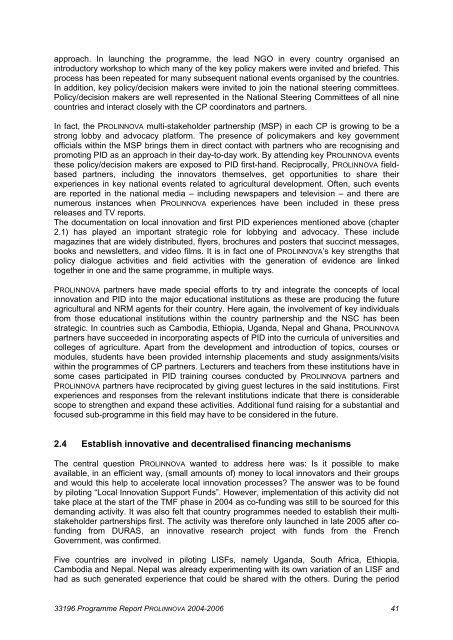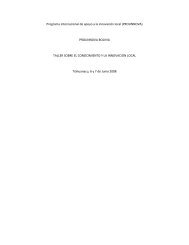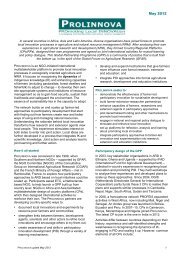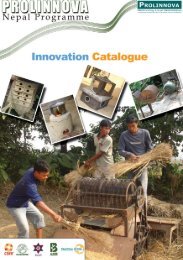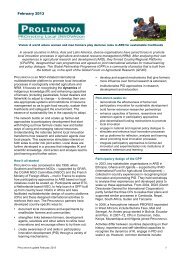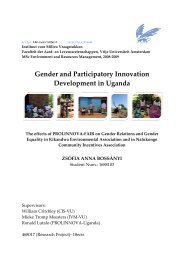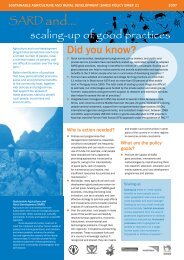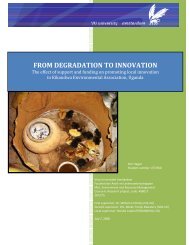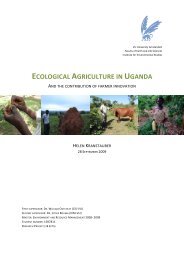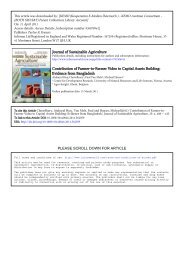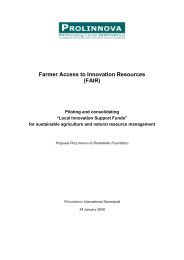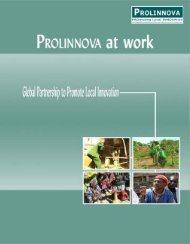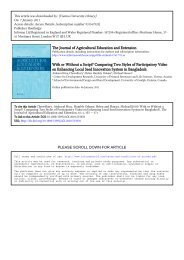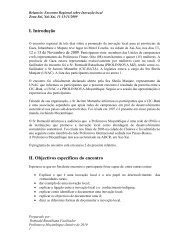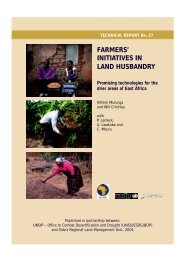2006 ANNUAL REPORT & PROGRAMME REPORT ... - Prolinnova
2006 ANNUAL REPORT & PROGRAMME REPORT ... - Prolinnova
2006 ANNUAL REPORT & PROGRAMME REPORT ... - Prolinnova
You also want an ePaper? Increase the reach of your titles
YUMPU automatically turns print PDFs into web optimized ePapers that Google loves.
approach. In launching the programme, the lead NGO in every country organised an<br />
introductory workshop to which many of the key policy makers were invited and briefed. This<br />
process has been repeated for many subsequent national events organised by the countries.<br />
In addition, key policy/decision makers were invited to join the national steering committees.<br />
Policy/decision makers are well represented in the National Steering Committees of all nine<br />
countries and interact closely with the CP coordinators and partners.<br />
In fact, the PROLINNOVA multi-stakeholder partnership (MSP) in each CP is growing to be a<br />
strong lobby and advocacy platform. The presence of policymakers and key government<br />
officials within the MSP brings them in direct contact with partners who are recognising and<br />
promoting PID as an approach in their day-to-day work. By attending key PROLINNOVA events<br />
these policy/decision makers are exposed to PID first-hand. Reciprocally, PROLINNOVA fieldbased<br />
partners, including the innovators themselves, get opportunities to share their<br />
experiences in key national events related to agricultural development. Often, such events<br />
are reported in the national media – including newspapers and television – and there are<br />
numerous instances when PROLINNOVA experiences have been included in these press<br />
releases and TV reports.<br />
The documentation on local innovation and first PID experiences mentioned above (chapter<br />
2.1) has played an important strategic role for lobbying and advocacy. These include<br />
magazines that are widely distributed, flyers, brochures and posters that succinct messages,<br />
books and newsletters, and video films. It is in fact one of PROLINNOVA’s key strengths that<br />
policy dialogue activities and field activities with the generation of evidence are linked<br />
together in one and the same programme, in multiple ways.<br />
PROLINNOVA partners have made special efforts to try and integrate the concepts of local<br />
innovation and PID into the major educational institutions as these are producing the future<br />
agricultural and NRM agents for their country. Here again, the involvement of key individuals<br />
from those educational institutions within the country partnership and the NSC has been<br />
strategic. In countries such as Cambodia, Ethiopia, Uganda, Nepal and Ghana, PROLINNOVA<br />
partners have succeeded in incorporating aspects of PID into the curricula of universities and<br />
colleges of agriculture. Apart from the development and introduction of topics, courses or<br />
modules, students have been provided internship placements and study assignments/visits<br />
within the programmes of CP partners. Lecturers and teachers from these institutions have in<br />
some cases participated in PID training courses conducted by PROLINNOVA partners and<br />
PROLINNOVA partners have reciprocated by giving guest lectures in the said institutions. First<br />
experiences and responses from the relevant institutions indicate that there is considerable<br />
scope to strengthen and expand these activities. Additional fund raising for a substantial and<br />
focused sub-programme in this field may have to be considered in the future.<br />
2.4 Establish innovative and decentralised financing mechanisms<br />
The central question PROLINNOVA wanted to address here was: Is it possible to make<br />
available, in an efficient way, (small amounts of) money to local innovators and their groups<br />
and would this help to accelerate local innovation processes? The answer was to be found<br />
by piloting “Local Innovation Support Funds”. However, implementation of this activity did not<br />
take place at the start of the TMF phase in 2004 as co-funding was still to be sourced for this<br />
demanding activity. It was also felt that country programmes needed to establish their multistakeholder<br />
partnerships first. The activity was therefore only launched in late 2005 after cofunding<br />
from DURAS, an innovative research project with funds from the French<br />
Government, was confirmed.<br />
Five countries are involved in piloting LISFs, namely Uganda, South Africa, Ethiopia,<br />
Cambodia and Nepal. Nepal was already experimenting with its own variation of an LISF and<br />
had as such generated experience that could be shared with the others. During the period<br />
33196 Programme Report PROLINNOVA 2004-<strong>2006</strong> 41


